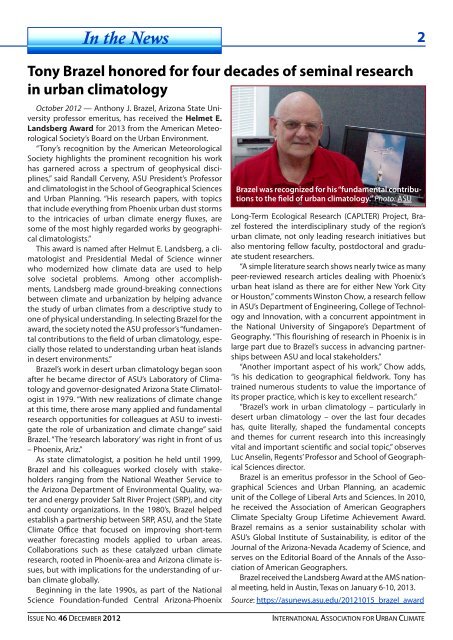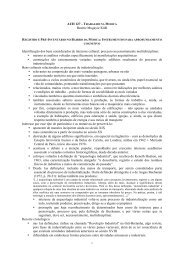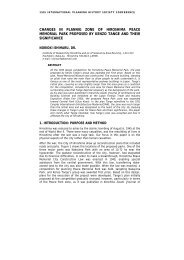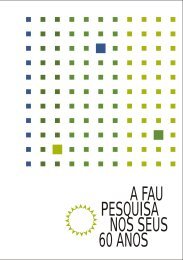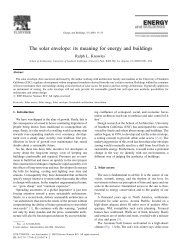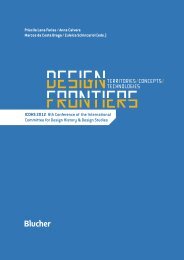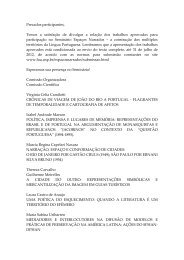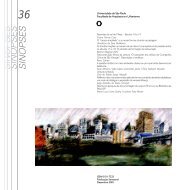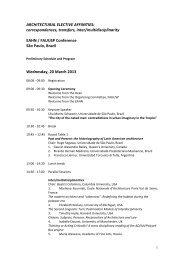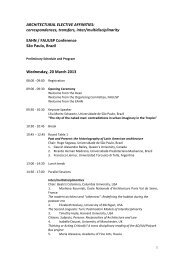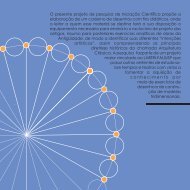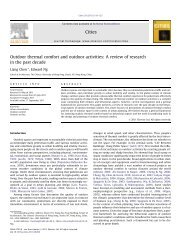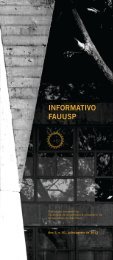Urban Climate News - FAU
Urban Climate News - FAU
Urban Climate News - FAU
Create successful ePaper yourself
Turn your PDF publications into a flip-book with our unique Google optimized e-Paper software.
In the <strong>News</strong> 2<br />
Tony Brazel honored for four decades of seminal research<br />
in urban climatology<br />
October 2012 — Anthony J. Brazel, Arizona State University<br />
professor emeritus, has received the Helmet E.<br />
Landsberg Award for 2013 from the American Meteorological<br />
Society’s Board on the <strong>Urban</strong> Environment.<br />
“Tony’s recognition by the American Meteorological<br />
Society highlights the prominent recognition his work<br />
has garnered across a spectrum of geophysical disciplines,”<br />
said Randall Cerveny, ASU President’s Professor<br />
and climatologist in the School of Geographical Sciences<br />
and <strong>Urban</strong> Planning. “His research papers, with topics<br />
that include everything from Phoenix urban dust storms<br />
to the intricacies of urban climate energy fluxes, are<br />
some of the most highly regarded works by geographical<br />
climatologists.”<br />
This award is named after Helmut E. Landsberg, a climatologist<br />
and Presidential Medal of Science winner<br />
who modernized how climate data are used to help<br />
solve societal problems. Among other accomplishments,<br />
Landsberg made ground-breaking connections<br />
between climate and urbanization by helping advance<br />
the study of urban climates from a descriptive study to<br />
one of physical understanding. In selecting Brazel for the<br />
award, the society noted the ASU professor’s “fundamental<br />
contributions to the field of urban climatology, especially<br />
those related to understanding urban heat islands<br />
in desert environments.”<br />
Brazel’s work in desert urban climatology began soon<br />
after he became director of ASU’s Laboratory of Climatology<br />
and governor-designated Arizona State Climatologist<br />
in 1979. “With new realizations of climate change<br />
at this time, there arose many applied and fundamental<br />
research opportunities for colleagues at ASU to investigate<br />
the role of urbanization and climate change” said<br />
Brazel. “The ‘research laboratory’ was right in front of us<br />
– Phoenix, Ariz.”<br />
As state climatologist, a position he held until 1999,<br />
Brazel and his colleagues worked closely with stakeholders<br />
ranging from the National Weather Service to<br />
the Arizona Department of Environmental Quality, water<br />
and energy provider Salt River Project (SRP), and city<br />
and county organizations. In the 1980’s, Brazel helped<br />
establish a partnership between SRP, ASU, and the State<br />
<strong>Climate</strong> Office that focused on improving short-term<br />
weather forecasting models applied to urban areas.<br />
Collaborations such as these catalyzed urban climate<br />
research, rooted in Phoenix-area and Arizona climate issues,<br />
but with implications for the understanding of urban<br />
climate globally.<br />
Beginning in the late 1990s, as part of the National<br />
Science Foundation-funded Central Arizona-Phoenix<br />
Brazel was recognized for his“fundamental contributions<br />
to the field of urban climatology.” Photo: ASU<br />
Long-Term Ecological Research (CAPLTER) Project, Brazel<br />
fostered the interdisciplinary study of the region’s<br />
urban climate, not only leading research initiatives but<br />
also mentoring fellow faculty, postdoctoral and graduate<br />
student researchers.<br />
“A simple literature search shows nearly twice as many<br />
peer-reviewed research articles dealing with Phoenix’s<br />
urban heat island as there are for either New York City<br />
or Houston,” comments Winston Chow, a research fellow<br />
in ASU’s Department of Engineering, College of Technology<br />
and Innovation, with a concurrent appointment in<br />
the National University of Singapore’s Department of<br />
Geography. “This flourishing of research in Phoenix is in<br />
large part due to Brazel’s success in advancing partnerships<br />
between ASU and local stakeholders.”<br />
“Another important aspect of his work,” Chow adds,<br />
“is his dedication to geographical fieldwork. Tony has<br />
trained numerous students to value the importance of<br />
its proper practice, which is key to excellent research.”<br />
”Brazel’s work in urban climatology – particularly in<br />
desert urban climatology – over the last four decades<br />
has, quite literally, shaped the fundamental concepts<br />
and themes for current research into this increasingly<br />
vital and important scientific and social topic,” observes<br />
Luc Anselin, Regents’ Professor and School of Geographical<br />
Sciences director.<br />
Brazel is an emeritus professor in the School of Geographical<br />
Sciences and <strong>Urban</strong> Planning, an academic<br />
unit of the College of Liberal Arts and Sciences. In 2010,<br />
he received the Association of American Geographers<br />
<strong>Climate</strong> Specialty Group Lifetime Achievement Award.<br />
Brazel remains as a senior sustainability scholar with<br />
ASU’s Global Institute of Sustainability, is editor of the<br />
Journal of the Arizona-Nevada Academy of Science, and<br />
serves on the Editorial Board of the Annals of the Association<br />
of American Geographers.<br />
Brazel received the Landsberg Award at the AMS national<br />
meeting, held in Austin, Texas on January 6-10, 2013.<br />
Source: https://asunews.asu.edu/20121015_brazel_award<br />
ISSUE NO. 46 DECEMBER 2012 INTERNATIONAL ASSOCIATION FOR URBAN CLIMATE


